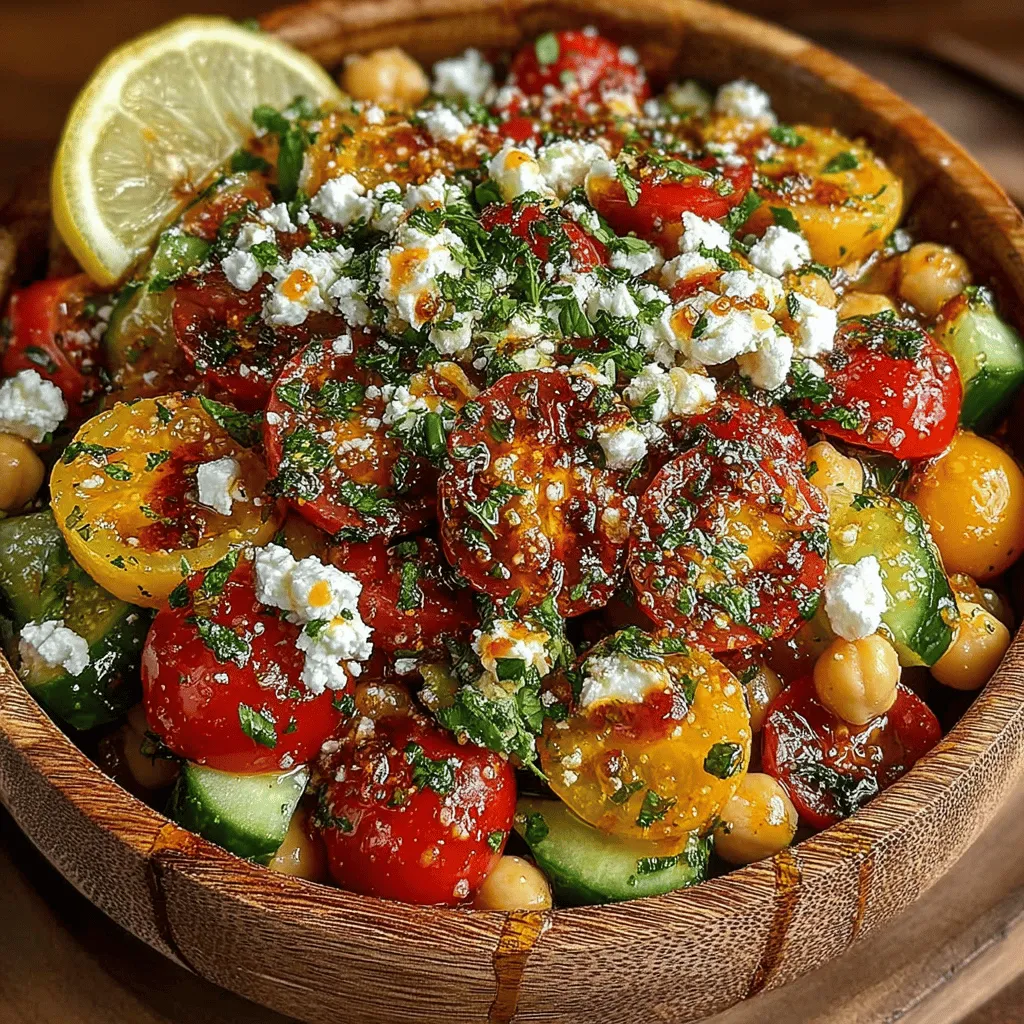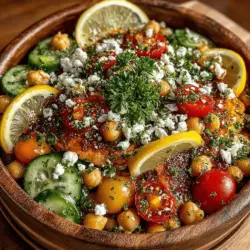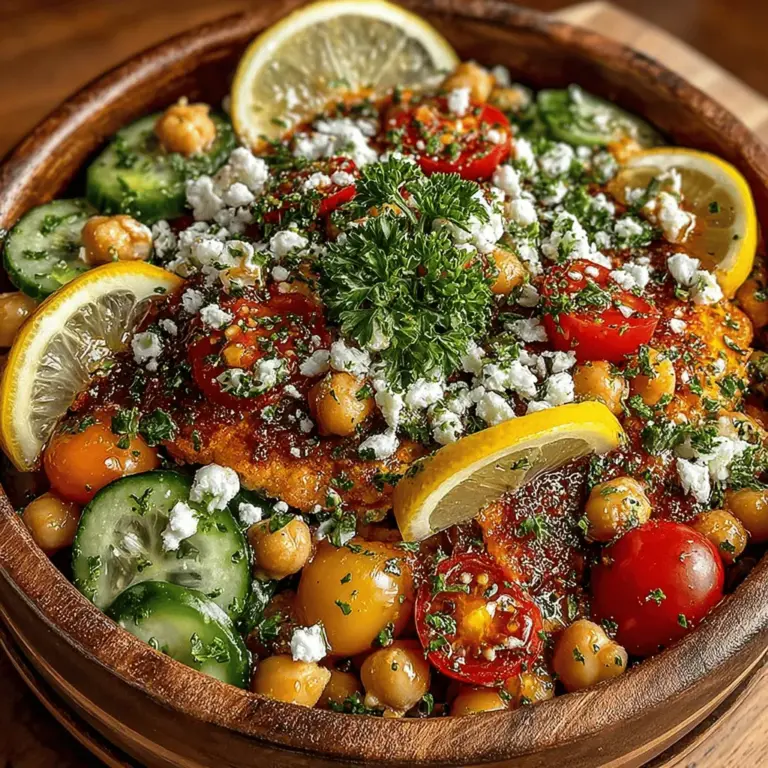Mediterranean cuisine is celebrated for its vibrant flavors, fresh ingredients, and numerous health benefits. Rich in fruits, vegetables, whole grains, and healthy fats, this culinary tradition promotes a balanced diet. One of the standout ingredients in this cuisine is the chickpea, a versatile legume that adds both texture and nutrition to a wide array of dishes. In this recipe, we will explore the delightful Mediterranean Chickpea Salad Bowls, which combine the earthiness of chickpeas with the freshness of vegetables and the richness of cheese, creating a satisfying meal that is both nourishing and delicious.
Ingredients
– 1 can (15 oz) chickpeas, drained and rinsed
– 1 cucumber, diced
– 1 cup cherry tomatoes, halved
– 1 bell pepper, diced (any color)
– 1/4 red onion, finely chopped
– 1/2 cup feta cheese, crumbled
– 1/4 cup olives, pitted and sliced (Kalamata or green)
– 1/4 cup fresh parsley, chopped
– 1/4 cup fresh mint, chopped
– 3 tablespoons olive oil
– 2 tablespoons red wine vinegar
– 1 teaspoon dried oregano
– Salt and pepper to taste
Instructions
1. Begin by preparing the chickpeas. Drain and rinse them under cold water to remove excess sodium and any canning liquid.
2. In a large mixing bowl, combine the chickpeas, diced cucumber, halved cherry tomatoes, diced bell pepper, and finely chopped red onion.
3. Gently fold in the crumbled feta cheese and sliced olives to the mixture.
4. In a separate small bowl, whisk together the olive oil, red wine vinegar, dried oregano, salt, and pepper to create the dressing.
5. Pour the dressing over the salad and toss gently to combine all ingredients evenly.
6. Add the chopped parsley and mint, and give the salad one final toss to incorporate the herbs.
7. Taste and adjust seasoning if necessary, then serve immediately or refrigerate for 30 minutes to allow the flavors to meld.
Understanding the Ingredients
The Mediterranean Chickpea Salad Bowls feature a variety of fresh ingredients that contribute to the dish’s overall flavor and nutrition.
Chickpeas: Nutritional Benefits and Culinary Versatility
Chickpeas, also known as garbanzo beans, are a fantastic source of plant-based protein and fiber. They help promote satiety and support digestive health. Their nutty flavor and firm texture make them an ideal addition to salads, stews, and curries.
Fresh Vegetables: Importance of Freshness in Mediterranean Dishes
Using fresh vegetables is crucial in Mediterranean cooking. They not only enhance the flavor profile of the dish but also provide essential vitamins and minerals. Crisp cucumbers, juicy tomatoes, and sweet bell peppers add a refreshing crunch and vibrant color to the salad.
Feta Cheese: The Role of Cheese in Flavor and Texture
Feta cheese is a staple in many Mediterranean recipes. Its tangy flavor and crumbly texture complement the chickpeas and vegetables, adding richness to the salad. Additionally, it provides a dose of calcium and protein.
Olives: Enhancing the Briny Flavor Profile
Olives bring a unique brininess to the dish, balancing the freshness of the vegetables. They are also a great source of healthy fats, which are integral to the Mediterranean diet.
The Significance of Herbs in Mediterranean Cooking
Herbs play a vital role in Mediterranean cuisine, offering not only flavor but also a plethora of health benefits. Fresh herbs like parsley and mint contribute aromatic qualities that elevate the dish.
Parsley and Mint: Freshness and Aromatic Qualities
Parsley is rich in vitamins K and C, while mint adds a refreshing note that brightens the salad. Together, they enhance the overall flavor and presentation of the Mediterranean Chickpea Salad Bowls.
Step-by-Step Preparation
Preparation is key to achieving the best flavor in your Mediterranean Chickpea Salad Bowls. Here’s how to get started:
Preparation of Chickpeas
Before incorporating chickpeas into your salad, it’s important to rinse and drain them. This step removes excess sodium and ensures a cleaner taste. For those who prefer using dried chickpeas, remember to soak and cook them beforehand.
Chopping and Mixing Fresh Ingredients
Uniform chopping is essential for even distribution of flavors in the salad. Use a sharp knife and cutting board to ensure that your vegetables are cut into similar sizes. If you have specific preferences for certain vegetables, feel free to substitute them based on availability and taste.
Crafting the Dressing
The dressing is a crucial element of the Mediterranean Chickpea Salad Bowls. Each ingredient contributes to the overall flavor profile, from the richness of olive oil to the acidity of red wine vinegar. Experimenting with different herbs and spices can help you personalize your dressing to suit your palate.
Combining and Serving the Salad
Layering flavors is vital when combining the salad. Toss the ingredients gently to ensure an even coating of dressing and that the flavors meld beautifully. Enjoy your Mediterranean Chickpea Salad Bowls as a light lunch or a refreshing side dish.

How to Integrate Feta and Herbs Without Compromising Texture
When adding feta cheese to your Mediterranean Chickpea Salad Bowls, it’s essential to crumble it rather than slicing to maintain its creamy texture while evenly distributing the flavors throughout the salad. Choose a high-quality feta, as its taste can elevate the dish significantly. Fresh herbs such as parsley, mint, or dill can be finely chopped and mixed in just before serving. This technique preserves their vibrant color and flavor, ensuring they don’t wilt or lose their freshness.
Serving Suggestions
To enhance your Mediterranean Chickpea Salad Bowls, consider serving them in a variety of ways. They can be enjoyed as a standalone dish, a hearty side, or even as a filling lunch option. For an extra crunch, sprinkle some toasted pine nuts or sunflower seeds on top just before serving. You can also serve with pita bread or whole grain crackers for added texture and flavor.
Presentation Tips for an Inviting Salad Bowl
An inviting presentation can make your Mediterranean Chickpea Salad Bowls even more appealing. Use a large, shallow bowl to display the colorful ingredients. Layer the salad with chickpeas on the bottom, followed by a vibrant mix of vegetables, and top with crumbled feta and herbs. Drizzle a light dressing over the top just before serving to enhance the visual appeal. Garnishing with additional herbs or a few slices of lemon can add a refreshing touch.
Pairing Ideas: What to Serve Alongside the Salad for a Complete Meal
To create a well-rounded meal, consider pairing your Mediterranean Chickpea Salad with grilled proteins such as chicken, shrimp, or fish. These options not only enhance the protein content but also complement the salad’s flavors. Additionally, serving with a side of roasted vegetables or a light soup can round out the meal beautifully, providing a variety of textures and tastes.
Nutritional Analysis
Breakdown of the Nutritional Content Per Serving
A typical serving of Mediterranean Chickpea Salad contains approximately:
– Calories: 350
– Proteins: 15g
– Fats: 20g
– Carbohydrates: 30g
Health Benefits of Mediterranean Diets
The Mediterranean diet is renowned for its health benefits, particularly its emphasis on plant-based ingredients. Incorporating chickpeas into your diet is a great way to add essential nutrients. Chickpeas are an excellent source of fiber, which aids digestion and promotes satiety.
Discussing the Role of Chickpeas in a Balanced Diet
Chickpeas are a staple in many Mediterranean dishes, providing a plant-based protein source that is versatile and nutritious. Their high fiber content supports digestive health, making them an excellent choice for maintaining gut health.
Variations and Customizations
Exploring Different Flavor Profiles
Feel free to experiment with different flavor profiles to keep your Mediterranean Chickpea Salad exciting. Consider adding ingredients like olives, sun-dried tomatoes, or roasted red peppers for a Mediterranean twist.
Adding Proteins: Grilled Chicken, Shrimp, or Chickpea Variations
To enhance the protein content, consider adding grilled chicken or shrimp. Alternatively, try using different chickpea variations, such as black chickpeas or split peas, to create unique tastes and textures.
Seasonal Vegetable Options to Keep the Salad Fresh
Incorporate seasonal vegetables into your salad to keep it fresh and vibrant. During the summer, consider adding cucumbers and bell peppers, while in the fall, roasted squash or Brussels sprouts can add a delightful twist.
Vegan Adaptations: Alternatives to Feta Cheese
For those following a vegan diet, there are several alternatives to feta cheese available. Consider using plant-based feta made from nuts or tofu, as these options provide a similar texture and tangy flavor.
Cultural Significance of Mediterranean Salads
History of Mediterranean Salads in Various Cultures
Mediterranean salads have a rich history, often reflecting the agricultural practices and culinary traditions of the region. They are a celebration of seasonal produce, highlighting the importance of fresh ingredients.
How This Dish Reflects Mediterranean Lifestyle Principles
These salads embody the Mediterranean lifestyle principles, emphasizing communal meals and the enjoyment of food with family and friends. They serve as a reminder to appreciate the simple pleasures of cooking and sharing.
The Role of Salads in Mediterranean Cuisine: More Than Just a Side Dish
In Mediterranean cuisine, salads are not merely side dishes; they often serve as the centerpiece of a meal. They highlight diverse flavors and textures, encouraging a balanced and healthy approach to eating.
Conclusion
In summary, Mediterranean Chickpea Salad Bowls are a deliciously simple and nutritious option that can be tailored to suit individual tastes. The health benefits of this dish, combined with its vibrant flavors, make it a joy to prepare and share with loved ones. Embrace the opportunity to experiment with various ingredients and flavors, and discover the joy of creating healthy meals that bring people together.


